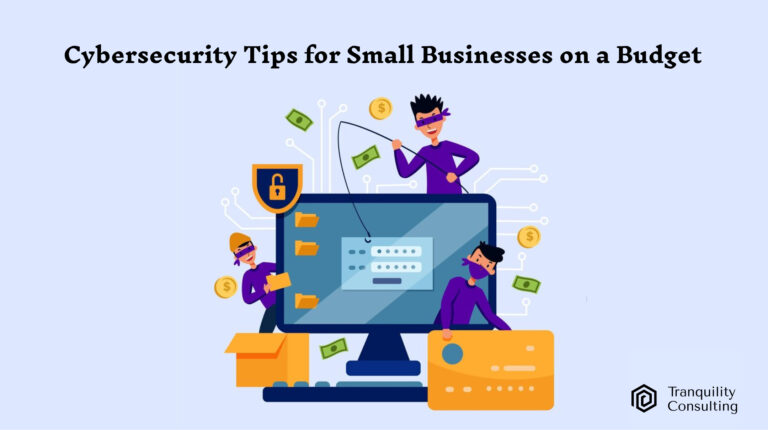In the digital age, small businesses face an ever-evolving threat landscape. Cybersecurity is no longer a luxury but a necessity. Yet, many small businesses operate on tight budgets, making implementing comprehensive cybersecurity measures seem daunting. The good news is that safeguarding your company doesn’t always require an extensive budget. With smart strategies and a focus on essential security practices, small businesses can protect their data, systems, and customers from cyber threats. This blog offers practical, budget-friendly cybersecurity tips for small businesses.
Understanding the Cybersecurity Threats Facing Small Businesses
Small businesses often think they are too small to be targeted by cybercriminals, but the reality is quite different. Hackers frequently see small businesses as easy prey because they assume such companies have limited cybersecurity defenses. Common threats include phishing attacks, ransomware, data breaches, and malware infections. These incidents can result in financial loss, reputational damage, and legal consequences. By recognizing the risks, small business owners can take proactive steps to secure their digital assets.
Start with a Cybersecurity Risk Assessment
Conducting a cybersecurity risk assessment is the first step in establishing effective cybersecurity on a budget. This assessment involves identifying the types of data you store, understanding potential vulnerabilities in your systems, and evaluating the likelihood of a cyber attack. You don’t need to hire a costly consultant for this process; many free tools and resources are available online to help small businesses conduct basic risk assessments. Once you have a clear picture of your vulnerabilities, you can prioritize your security efforts based on your budget and the highest-risk areas.
Invest in Employee Training and Awareness
- One of the most cost-effective cybersecurity measures is employee training. Many cyber incidents can be traced back to human error, such as clicking on a malicious link or using weak passwords. Providing cybersecurity training for employees can significantly reduce these risks. Many free and low-cost online courses can teach your team about best practices, such as recognizing phishing attempts, creating strong passwords, and safely handling sensitive data.
- Establish a culture of cybersecurity awareness within your organization to reinforce training. Encourage employees to report suspicious emails or activities and regularly remind them of the importance of following cybersecurity protocols. When employees understand their critical role in maintaining security, they become the first line of defense against cyber threats.
Use Strong Passwords and Implement Multi-Factor Authentication (MFA)
- Passwords are often the weakest link in a company’s cybersecurity defenses. Hackers can easily crack simple or reused passwords, leading to unauthorized access to sensitive information. Employees must use strong, unique passwords for each account to address this. A good password should include a mix of uppercase and lowercase letters, numbers, and special characters. To simplify password management, consider using a password manager. Many affordable or accessible password managers can securely generate and store complex passwords.
- Additionally, implementing Multi-Factor Authentication (MFA) is a budget-friendly way to add an extra layer of security. MFA requires users to provide two or more verification factors—such as a password and a code sent to their mobile device—before accessing an account. This significantly reduces the risk of unauthorized access, even if a password is compromised.
Keep Software and Systems Up-to-Date
- Cybercriminals commonly target outdated software and systems, exploiting known vulnerabilities to access networks. One of the simplest and most affordable cybersecurity measures is to ensure that all software, including operating systems, browsers, and applications, is kept up-to-date.
- Many software vendors release regular patches to address security vulnerabilities, and applying these updates as soon as they become available can protect your business from known threats. Where possible, enable automatic updates to protect your systems without manual intervention. This practice can save time and money while maintaining a solid level of cybersecurity.
Utilize Free and Affordable Security Tools
- A wide range of accessible and affordable cybersecurity tools are designed to help small businesses secure their digital environments. Many reputable cybersecurity companies offer free versions of their tools, including firewalls, antivirus software, and anti-malware solutions. For example, Avast, Bitdefender, and Malwarebytes provide reliable antivirus protection at no cost. While the free versions may lack some advanced features, they offer essential protection against common threats.
- Open-source security tools can also be a viable option for small businesses with a limited budget. Programs like Snort (an intrusion detection system) and OpenVAS (a vulnerability scanner) can provide robust security features without the high costs associated with commercial products. Evaluate your business needs and choose tools that fit your specific requirements.
Back-Up Your Data Regularly
- Data loss due to a cyber attack can devastate a small business. Implementing a regular data backup strategy is one of the most effective and budget-friendly ways to mitigate the impact of ransomware or other data breaches. Ensure you back up critical business data regularly and store backups in multiple locations, such as cloud storage and external hard drives. This approach guarantees you can quickly recover your data during a cyber incident, minimizing downtime and financial loss.
- Many affordable cloud backup solutions, such as Google Drive, Dropbox, and Microsoft OneDrive, are available. These services often offer free plans with limited storage or reasonably priced packages that suit the needs of small businesses.
Secure Your Wi-Fi Network and Use a VPN
- Your Wi-Fi network is a gateway to your digital assets; securing it is crucial. Start by changing your router’s username and password, as default settings are often publicly known and can be exploited. Use a strong, unique password for your Wi-Fi network, and enable WPA3 encryption, the latest and most secure encryption standard for wireless networks. If your router doesn’t support WPA3, ensure it’s set to use at least WPA2 encryption.
- In addition to securing your Wi-Fi, consider using a Virtual Private Network (VPN) for remote work. A VPN encrypts internet traffic, making it difficult for hackers to intercept sensitive information. Many affordable VPN services are available for small businesses, ensuring secure communication between remote employees and the company’s network.
Develop an Incident Response Plan
- No matter how robust your cybersecurity measures are, it’s crucial to be prepared for the possibility of a security breach. Developing an incident response plan allows you to respond quickly and effectively if a cyber attack occurs. Your plan should outline the steps to take in the event of an incident, such as containing the breach, notifying affected parties, and restoring data from backups. Having a clear, pre-defined response can minimize the impact of a cyber attack and speed up the recovery process.
- Review and update your incident response plan regularly, and ensure that all employees are familiar with their roles in the event of a security breach. Practice mock incidents to test your response procedures, identifying gaps or areas for improvement.
Leverage Cloud Security
- Many small businesses are turning to cloud services for their affordability, scalability, and convenience. Cloud providers like AWS, Microsoft Azure, and Google Cloud invest heavily in security, offering small businesses a secure environment for their data and operations. Small businesses can benefit from enterprise-level security without the hefty price tag by leveraging cloud-based solutions.
- When using cloud services, it’s essential to follow best practices, such as configuring security settings properly, enabling encryption, and limiting access based on user roles. Regularly review your cloud security settings to ensure they align with your business’s evolving needs.
Conclusion
Cybersecurity tips for small businesses don’t have to break the bank. By prioritizing basic yet effective security measures, you can significantly reduce the risk of cyber attacks without overspending. From employee training and strong passwords to regular software updates and leveraging cloud security, these budget-friendly tips can fortify your small business against cyber threats. With the right strategies, even a small budget can protect your company’s assets and reputation. Remember, the key to effective cybersecurity lies in tools and technology and in building a culture of vigilance and awareness across your organization.
FAQs
- Why is cybersecurity crucial for small businesses?
It protects sensitive data and prevents financial and reputational losses from cyber threats. - How can small businesses secure themselves on a budget?
Use free tools, train employees, and ensure strong passwords and software updates. - What are common cyber threats to small businesses?
Phishing, ransomware, malware, and data breaches are frequent threats. - Are there free cybersecurity tools available?
Yes, tools like Avast, Bitdefender, and Snort provide essential protection. - How often should businesses back up data?
Regularly, such as daily or weekly, with backups stored in multiple locations.
If you have any questions or need business-related tax consulting advice, please contact us at: [email protected]





